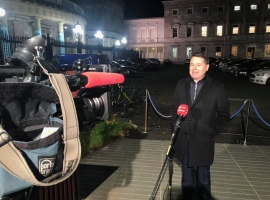
Goodbody Stockbrokers says Ireland will enter a lockdown akin to that experienced in April 2020 in the coming days, with an announcement expected later today. Goodbody say public adherence and the pace of vaccine rollout will determine whether the three week period will be enough.
The new lockdown is expected to include the closure of schools and most construction work for a period of three weeks. A decision is expected at cabinet today and comes after the exponential rise in cases and, more importantly, hospitalisations in recent weeks.
On the latter, there are currently 817 people in hospital with COVID-19, with the April 2020 peak of 881 being possibly exceeded today given the recent growth.
At the height of the lockdown in April 2020, the unemployment rate, including those on the Pandemic Unemployment Payment (PUP) reached 30.4%. An additional 12% were in on the wage subsidy scheme. Spending fell sharply at that time, contributing to a 19% fall in consumer spending in the second quarter.
However, Goodbody say that spending can bounce back strongly, evidenced by the 21% bounce in third quarter. With manufacturing to continue and working-from-home now a more familiar setting for those in the services sector, Goodbody say the international parts of the economy will continue to outperform in the early part of the year.
Taoiseach Micheal Martin stated yesterday that 135,000 people would be fully vaccinated (2 doses) by end-February. This represents just 3% of the Irish population and less than 30% of the vulnerable over-70 cohort.
According to Goodbody Stockbrokers, "Information on whether this slow pace is due to lack of supply is hard to come by, but it is clear other EU states are having similar issues. Government supports will clearly be needed once again in the context of ongoing restrictions. Fortunately, the Irish government was prudent in budgeting for both a hard-Brexit and a continuation of the COVID-19 pandemic for much of the year. Those budgeted resources will be required and 2020 has shown that schemes like the PUP and the employment wage subsidy are a vital lifeline."
Source: www.businessworld.ie
















